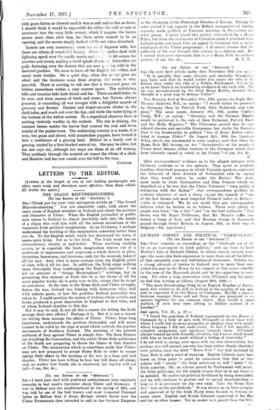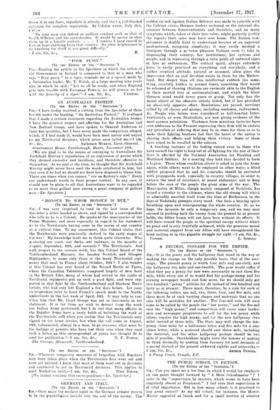RICHARD COBDEN AND POLITICAL "CAMOUFLAGE."
ITo Tar Emma or ran " SPICTITOR.") Suc,—Your remarks on camouflage, or the "wholesale 1150 of tic lie as an instrument in Irish politics," sent me back to Lord Morley's Life of Richard Cobden, in which—nearly seventy years ago—the .nie idea finds expression in more than one of the letters of that eminently sane and well-balanced statesman. Cobden was a strong advocate of justice to Ireland, and he more than 0110V risked his seat in the House by his 'support of that cause—notably in the case of the Maynooth grant end by his opposition to coer- cion. Yet after a long association with O'Connell and Iris party we find him writing as follows (August 28th, 1848) " The most discouraging thing to nu English Member of Parlia- ment who wishes to do well to Ireland is the quality of the Dreg sent to represent it in the House of Common. Hardly a man a business amongst them and not three who are prepared to co- operate together for one common object. How would it mend matters if such men were sitting in Dublin instead of in London?"
And again, Vol. II., p. 27:- " I found the populace of Ireland represented in the House of Commons by a body of men with O'Connell at their head with whom I could feel no more sympathy or identity than with people whose language I did not understand. In. fast I felt, morally, a complete antagonism and repulsion towards them. O'Connell always treated me with friendly attention, but I never shook hands with him or faced his smile without a feeling of insecurity."
I do not wish to occupy your space with my own observations, but perhaps you will permit one who has been rather closely identified with politics since the label " Home Rule " was first invented by Isaac Butt to add a word of warning. English Liberals have been lured on from point to point by useurances that this or that scheme will " satisfy " the Irish politician or will " settle " the Irish question. Sir, no scheme passed by Parliament will satisfs the Irish politician, for the simple reason that he is not there to be satisfied. He makes his political livelihood by being dissatisfied, and he will continue to profess and to spread dissatisfaetiou 15-■ long no it ie necessary for his own ends. Take the Home Rule Act " now on the statute-book" It was drawn up on lives acceptec: and approved of by the Irish Party from Session to Session for many years. English and Scotch Liberals supported it for that and for no other reason. Yet no sooner is it passed than the Iris],
throw it in our feces, repudiate it utterly, and start a full-blooded agitation for complete separation. As Cobden wrote, July 21st, 1s48 No sane man can defend or palliate conduct such as that of Smith O'Brien and his confederates. It would he mercy to shut them up in a lunatic asylum. . . . I confess I have ceased to fear or hope anything from that country. Its utter helplessness to do anything for itself is our great difficulty."















































 Previous page
Previous page